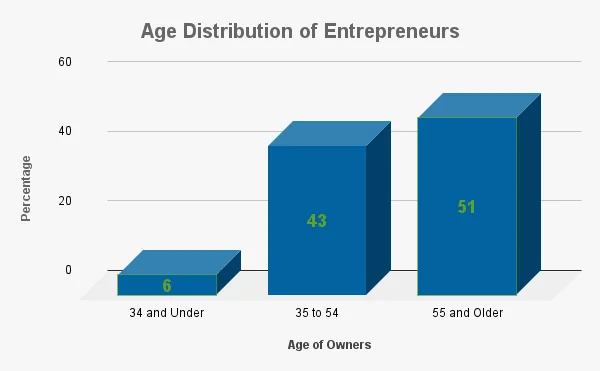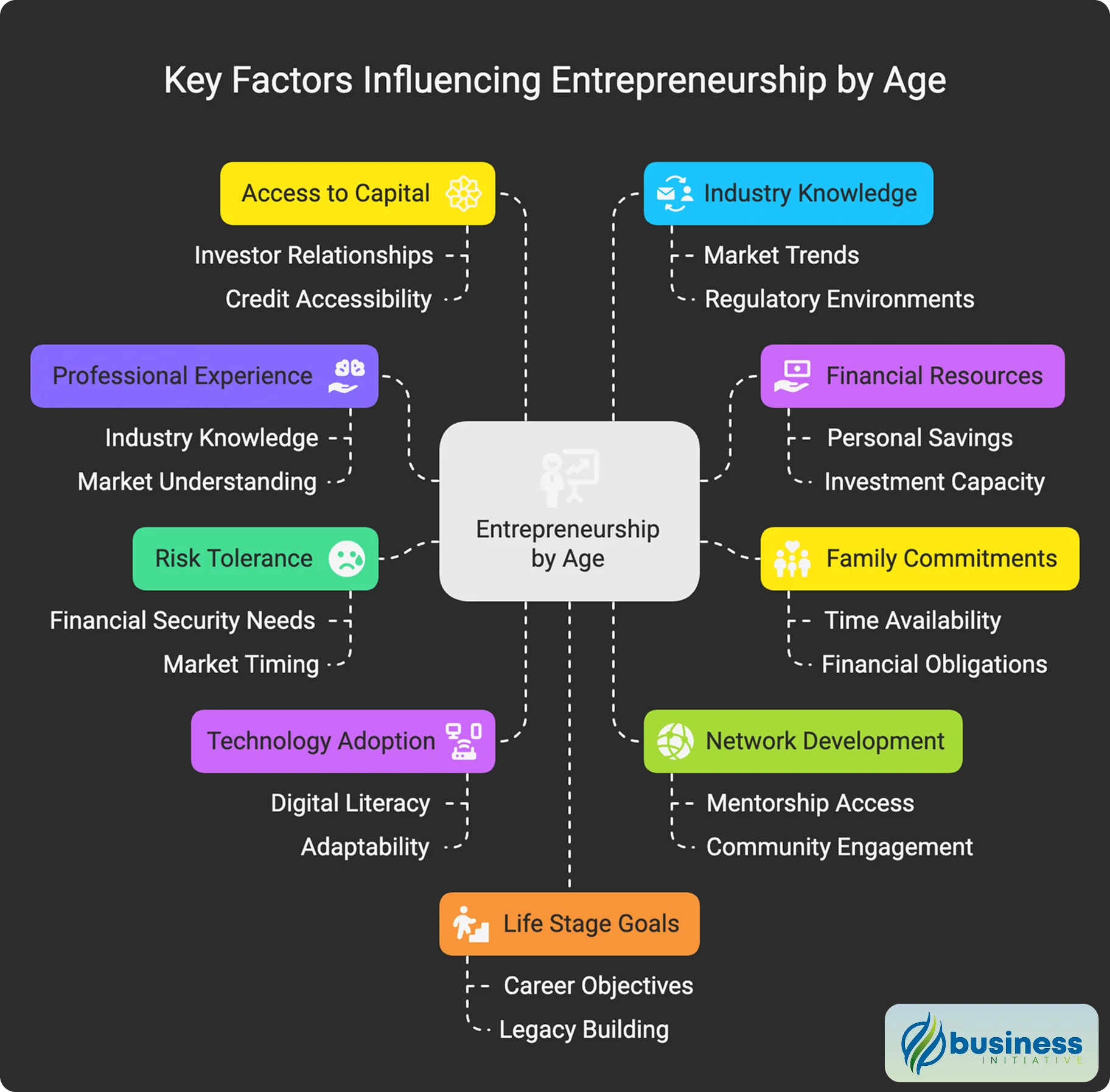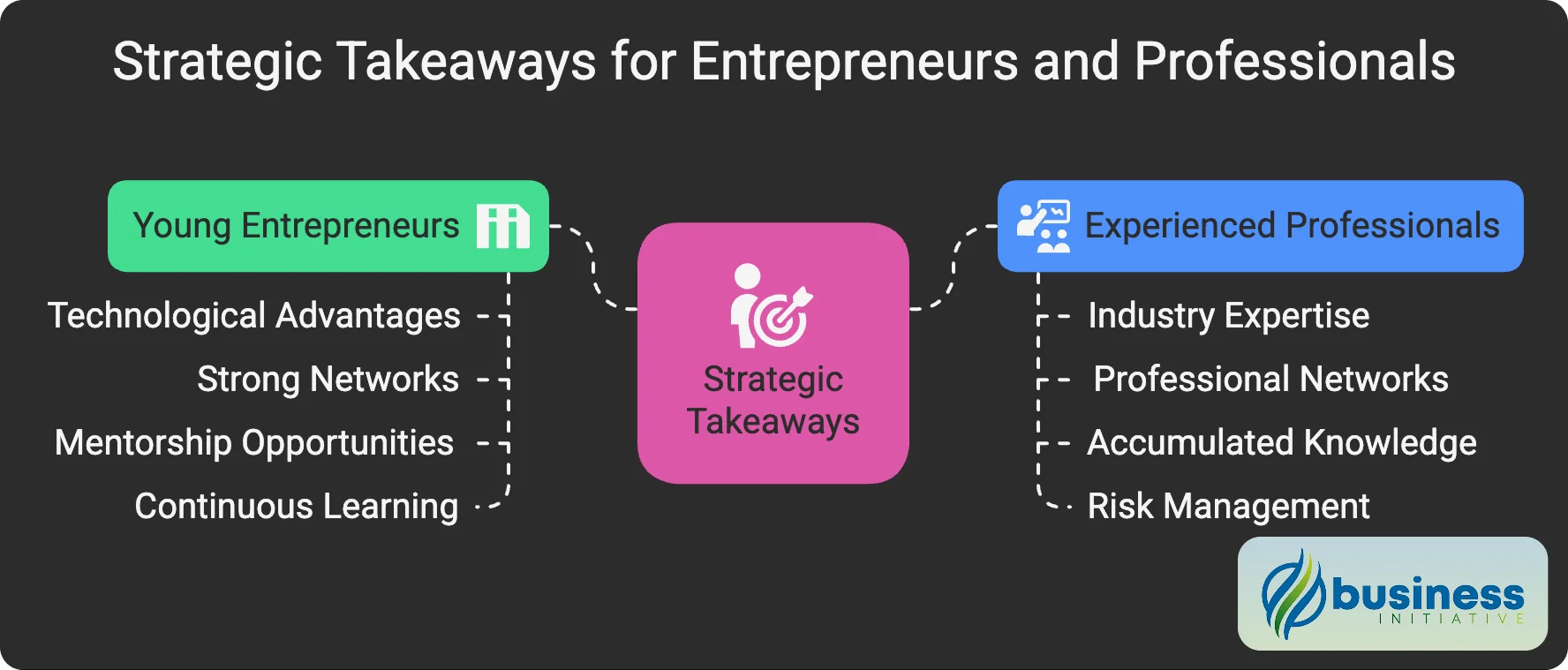The entrepreneurial landscape has evolved dramatically in recent decades.
With technological advances and societal shifts creating unprecedented opportunities for people of all ages to launch and grow successful businesses.
But is there an ideal age to become an entrepreneur?
Let's dive into the data and discover the fascinating relationship between age and entrepreneurial success.
The data reveals a clear pattern: while entrepreneurship is possible at any age, certain age groups show distinct advantages.
The average age of successful entrepreneurs is 42 years, with peak success rates occurring in the 40s and 50s age range.
📊 Key Statistics at a Glance
- 🎯 Average Age of Successful Entrepreneurs: 42 years
- 📈 Peak Success Rate: Entrepreneurs in their 40s and 50s
- 💡 Tech Industry Exception: Tends to have younger founders
These statistics highlight the value of experience in entrepreneurship.
The tech industry stands out as an exception, where younger founders often thrive in innovation-driven environments.
📈 Age Distribution Analysis
 Age distribution of business owners by age group. Data shows higher concentration of entrepreneurs in 40-50 age range. Source: U.S. Census Bureau (2019)
Age distribution of business owners by age group. Data shows higher concentration of entrepreneurs in 40-50 age range. Source: U.S. Census Bureau (2019)
Industry Variations
Tech Sector
- Younger average age
- Notable examples: Facebook, Snapchat founders (early 20s)
- Innovation-driven environment
Traditional Industries
- Higher average age (40s-50s)
- Includes retail, healthcare, professional services
- Experience-valued sectors
🎯 9 Key Factors Influencing Entrepreneurship by Age

1. Professional Experience
Professional experience plays a crucial role in entrepreneurship, as it encompasses industry knowledge, market understanding, professional networks, and developed skill sets that are essential for business success.
2. Financial Resources
Having robust financial resources, including personal savings, investment capacity, credit history, and a solid asset base, is vital for entrepreneurs to fund their ventures and sustain operations.
3. Family Commitments
Family commitments can significantly influence an entrepreneur's journey, affecting time availability, financial obligations, work-life balance, and the support systems they rely on.
4. Risk Tolerance
Risk tolerance varies with age, impacting how entrepreneurs perceive risks, their financial security needs, career stage considerations, and decisions regarding market timing.
5. Technology Adoption
Technology adoption is crucial for modern entrepreneurs, requiring digital literacy, an innovation mindset, adaptability, and skills in tech integration to stay competitive.
6. Network Development
Building and maintaining a strong network is essential for entrepreneurs, as it provides professional connections, industry relationships, mentorship access, and community engagement opportunities.
7. Access to Capital
Access to capital is a critical factor, involving funding opportunities, investor relationships, credit accessibility, and a proven financial track record to secure necessary resources.
8. Industry Knowledge
Industry knowledge provides entrepreneurs with sector expertise, awareness of market trends, competitive insights, and an understanding of regulatory environments, all of which are crucial for informed decision-making.
9. Life Stage Goals
Life stage goals, including career objectives, retirement planning, personal fulfillment, and legacy building, shape an entrepreneur's motivations and strategic choices.
📊 Success Rates by Age: The Data Speaks
Key Findings from Harvard Business Review Research:
- 🎯 50-year-old founders: 2x more likely to succeed than 30-year-olds
- 📈 60-year-old founders: Higher success rates than 20-something entrepreneurs
- 💡 Sample size: 2.7 million business founders studied
The Harvard Business Review study provides compelling evidence that age and experience significantly impact entrepreneurial success.
The research, based on 2.7 million business founders, shows that older entrepreneurs achieve higher success rates than their younger counterparts.
➤ Related Reading: Unlock the secrets to avoid the most common pitfalls small businesses face in 2025!
🚀 Strategic Takeaways

For Young Entrepreneurs
Young entrepreneurs should leverage technological advantages to stay ahead in the competitive market.
Building strong networks early in their careers can provide valuable connections and opportunities.
Seeking mentorship opportunities is crucial for gaining insights and guidance from experienced professionals.
Additionally, focusing on continuous learning will help them adapt to changing industry trends and enhance their skills.
For Experienced Professionals
Experienced professionals can utilize their industry expertise to make informed decisions and drive business success.
Leveraging professional networks can open doors to new partnerships and collaborations.
Applying accumulated knowledge from past experiences can lead to innovative solutions and strategies.
Balancing risk with experience is essential to ensure sustainable growth and minimize potential setbacks.
FAQs - Frequently Asked Questions About The Age of Entrepreneurs

What is the best age to start a business?
The average age of successful entrepreneurs is 42 years, with peak success rates occurring in the 40s and 50s.
However, success is possible at any age, with different advantages at different life stages.
Learn More...
Research from Harvard Business Review, analyzing 2.7 million business founders, shows that 50-year-old entrepreneurs are twice as likely to succeed compared to 30-year-olds.
The study also found that 60-year-old founders achieve higher success rates than 20-something entrepreneurs.
Success factors vary by age group:
- 20s-30s: Tech-savvy, innovative thinking, high energy
- 40s-50s: Experience, networks, financial stability
- 60s+: Industry expertise, established reputation, financial resources
The tech industry is an exception, where younger founders often thrive due to the innovation-driven environment.
Why do older entrepreneurs have higher success rates?
Older entrepreneurs benefit from accumulated experience, established networks, and greater financial resources.
Learn More...
Professional experience provides crucial advantages:
- Industry knowledge and market understanding
- Established professional networks
- Better access to capital and funding
- Stronger credit history and financial track record
Older entrepreneurs typically have:
- More developed skill sets
- Better risk assessment capabilities
- Stronger industry relationships
- Greater financial stability
The Harvard Business Review study found that 50-year-old founders are twice as likely to succeed as 30-year-olds, based on analysis of 2.7 million business founders.
What advantages do young entrepreneurs have?
Young entrepreneurs excel in technology adoption, innovation, and risk-taking, particularly in the tech sector.
Learn More...
Young entrepreneurs bring unique strengths to the table:
- Natural digital literacy and tech-savviness
- Fresh perspectives and innovative thinking
- Higher risk tolerance
- Adaptability to new technologies
Notable examples include:
- Mark Zuckerberg (Facebook) - started at 19
- Evan Spiegel (Snapchat) - started at 21
- Bill Gates (Microsoft) - started at 20
Young entrepreneurs should focus on:
- Building strong networks early
- Seeking mentorship opportunities
- Continuous learning and skill development
- Leveraging technological advantages
How does age affect business success in different industries?
Tech startups tend to have younger founders, while traditional industries like retail and healthcare favor experienced entrepreneurs in their 40s-50s.
Learn More...
Industry variations in founder age:
- Tech Sector: Younger average age, innovation-driven
- Traditional Industries: Higher average age (40s-50s)
- Professional Services: Experience-valued sectors
Success factors by industry:
- Tech: Innovation, technical skills, market disruption
- Retail: Customer service, operations, market knowledge
- Healthcare: Regulatory compliance, professional credentials
- Professional Services: Industry expertise, client relationships
The U.S. Census Bureau data shows higher concentration of entrepreneurs in the 40-50 age range across most industries.
What financial considerations should entrepreneurs consider at different ages?
Young entrepreneurs need to build credit and savings, while older entrepreneurs should balance retirement planning with business investment.
Learn More...
Financial considerations by age group:
- 20s-30s: Building credit history, securing initial funding
- 40s-50s: Balancing business investment with family obligations
- 60s+: Managing retirement assets while growing business
Key financial factors:
- Personal savings and investment capacity
- Credit history and accessibility
- Asset base and collateral
- Family financial obligations
Access to capital varies by age:
- Young entrepreneurs: Focus on bootstrapping and angel investors
- Mid-career entrepreneurs: Bank loans and venture capital
- Older entrepreneurs: Personal assets and industry connections
How can entrepreneurs leverage their age as an advantage?
Young entrepreneurs should focus on tech innovation, while older entrepreneurs should leverage their experience and networks.
Learn More...
Age-specific advantages and strategies:
- Young Entrepreneurs:
- Leverage technological advantages
- Build strong networks early
- Seek mentorship opportunities
- Focus on continuous learning
- Experienced Professionals:
- Utilize industry expertise
- Leverage professional networks
- Apply accumulated knowledge
- Balance risk with experience
Success strategies by age:
- 20s-30s: Focus on innovation and market disruption
- 40s-50s: Build on industry experience and relationships
- 60s+: Share knowledge and mentor others
What role does technology play in age-related entrepreneurial success?
Technology adoption is crucial for all entrepreneurs, with younger founders having natural advantages in digital literacy and innovation.
Learn More...
Technology adoption factors:
- Digital literacy and tech-savviness
- Innovation mindset and adaptability
- Tech integration skills
- Market disruption potential
Age-related tech considerations:
- Young entrepreneurs: Natural digital natives
- Mid-career entrepreneurs: Need to stay current
- Older entrepreneurs: Focus on strategic tech adoption
Tech industry exceptions:
- Younger average age of founders
- Innovation-driven environment
- Lower capital requirements
- Higher risk tolerance
How can entrepreneurs overcome age-related challenges?
Focus on leveraging your unique advantages while addressing potential limitations through strategic planning and continuous learning.
Learn More...
Age-specific challenges and solutions:
- Young Entrepreneurs:
- Build credibility through expertise
- Develop professional networks
- Seek experienced mentors
- Focus on continuous learning
- Older Entrepreneurs:
- Stay current with technology
- Adapt to market changes
- Balance experience with innovation
- Build intergenerational teams
Universal strategies:
- Continuous learning and skill development
- Building strong professional networks
- Staying adaptable to market changes
- Focusing on unique value propositions


